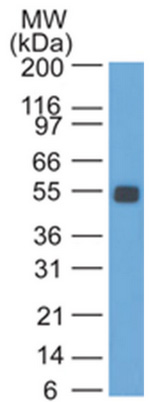Epcam Mouse Monoclonal Antibody [Clone ID: SPM534]
Other products for "Epcam"
Specifications
| Product Data | |
| Clone Name | SPM534 |
| Applications | FC, IF, IHC, IP, WB |
| Recommended Dilution | Western blot analysis: 1/100-1/200. Flow Cytometry: 5-10 µl/106 cells. Immunofluorescence: 1/50-1/100. Immunoprecipitation: 5-10 µl/500 µg protein lysate. Immunohistochemistry on Frozen and Formalin-Fixed Paraffin Sections: 1/100-1/200 for 30 minutes at RT. Formalin/paraffin tissues REQUIRE digestion of tissue sections with pepsin at 1 mg/ml Tris-HCl, pH 2.0 for 15 min at RT or 10 min at 37°C. Positive Control: Rat Small intestine or Colon. |
| Reactivities | Rat |
| Host | Mouse |
| Isotype | IgG1 |
| Clonality | Monoclonal |
| Immunogen | Rat small intestine cells. |
| Specificity | Epitope of SPM534 and SPM535 monoclonal antibodies are different. EGP40 is a 40-43kDa transmembrane epithelial glycoprotein, also identified as epithelial specific antigen (ESA), or epithelial cellular adhesion molecule (Ep-CAM). It is expressed on baso-lateral cell surface in most simple epithelia and a vast majority of carcinomas. Cellular Localization: Cell surface. |
| Formulation | State: Supernatant State: Liquid Bioreactor Concentrate Preservative: 0.05% Sodium Azide |
| Conjugation | Unconjugated |
| Storage | Store undiluted at 2-8°C. |
| Stability | Shelf life: one year from despatch. |
| Predicted Protein Size | 40-43 kDa |
| Gene Name | epithelial cell adhesion molecule |
| Database Link | |
| Background | EpCAM, or CD326, is an ~40 kDa transmembrane glycoprotein involved in a number of cellular processes including adhesion, proliferation, maintenance of stemness, migration and invasion (Spizzo, 2012, Denzel, 2012). It is expressed on most, but not all, normal epithelia and their corresponding malignancies. Although the role of EpCAM expression in tumorigenesis remains to be fully elucidated, it may downregulate immunity and help tumors actively escape from immune surveillance. Since the 1980s, EpCAM has been recognized as a pan-carcinoma antigen marker because of its widespread expression on epithelium and their derived tumors (Litnov, 1994; Ruf, 2007). More recently, it has also been identified as a stem cell marker, and it is thought that EpCAM antibody positive tumor cells may have stem-like properties (Flatmark, 2011). EpCAM antibody is widely used to help distinguish epithelial from non-epithelial neoplasms. EpCAM antibody positive tumors are epithelium derived, whereas EpCAM antibody negative tumors can originate from either non-epithelial or epithelial tissues. EpCAM antibody has also been used for identifying circulating tumor cells (Saif, 2012, de Albuquerque, 2012). It is often used as part of a panel with other tumor or tissue antibody markers when classifying tumors of known, suspected or elusive origin. EpCAM expression may be upregulated in tumors and overexpression can most pronounced on tumor initiating cells (Imrich, 2012). Overexpression may be an indication of early malignancy and correlate with a poor prognosis (Ruf, 2007). |
| Synonyms | Ep-CAM, Epithelial cell adhesion molecule, GA733-2, EGP314, KSA, TROP1, Trop-1, M1S2, M4S1, MIC18 |
| Reference Data | |
Documents
| Product Manuals |
| FAQs |
| SDS |
{0} Product Review(s)
0 Product Review(s)
Submit review
Be the first one to submit a review
Product Citations
*Delivery time may vary from web posted schedule. Occasional delays may occur due to unforeseen
complexities in the preparation of your product. International customers may expect an additional 1-2 weeks
in shipping.






























































































































































































































































 Germany
Germany
 Japan
Japan
 United Kingdom
United Kingdom
 China
China



